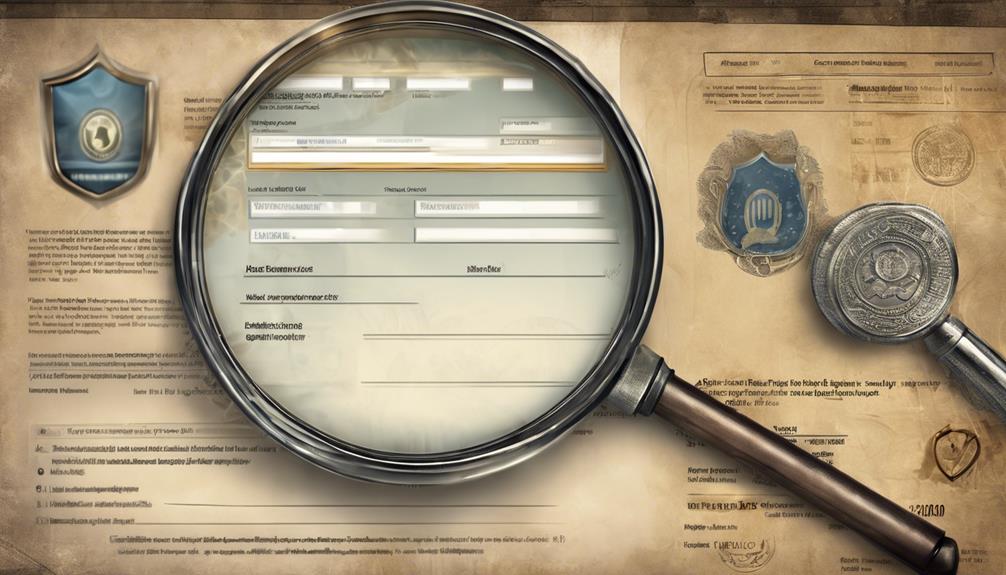When it comes to background checks in Brazil, understanding the General Data Protection Law (LGPD) is essential. This law mandates explicit consent, minimal data collection, and fair treatment of job applicants. Various types of checks, including criminal records and educational verification, are tailored to specific job requirements. Navigating compliance and privacy laws, especially LGPD regulations, is vital for employers. Industry-specific considerations and benefits like improving workplace security should not be overlooked. Employers should prioritize best practices, ensuring information accuracy and respecting candidate privacy. For a deeper understanding of background checks in Brazil, explore the legal framework and industry standards.
Key Takeaways
- Adhere to LGPD and labor laws for background checks.
- Obtain explicit consent from job applicants.
- Tailor checks to job requirements in different sectors.
- Conduct Legitimate Interest Assessments (LIA) for justification.
- Emphasize data security, transparency, and fair treatment.
Legal Framework in Brazil

The legal framework in Brazil for background checks is primarily governed by the General Data Protection Law (LGPD). This law mandates that background checks conducted by employers must adhere to labor laws, privacy regulations, and guarantee data security.
One key requirement is obtaining explicit consent from job applicants before initiating any background screening process. The LGPD also stresses the importance of minimal data collection and conducting a Legitimate Interest Assessment (LIA) to guarantee that the background checks are necessary and justified.
Compliance with Brazilian laws is vital to avoid legal repercussions when performing background checks in Brazil. Employers must also be cautious to prevent any form of discrimination based on protected characteristics and must ensure fair treatment of all applicants throughout the background check procedure.
Adhering to these guidelines is important to guarantee that background checks in Brazil are conducted ethically and within the bounds of the law.
Types of Background Checks
What types of background checks are commonly conducted in Brazil to assess job applicants' qualifications and credibility?
Employers in Brazil often rely on a range of background checks to evaluate potential employees thoroughly. This typically includes criminal record checks, employment verification, education verification, credit history checks, and reference checks. These checks aim to provide a holistic view of an individual's background, ensuring they meet the necessary criteria for the role.
Additionally, industry-specific background checks are common in Brazil, tailored to specific job requirements. For instance, positions in transportation may necessitate driving record checks. Besides, social media background checks are gaining popularity as a tool to assess candidates' online behavior and character.
Different sectors may have varying demands, leading to specific types of background checks to ascertain the suitability and reliability of potential employees. Conducting a diverse set of background checks helps employers make informed decisions when hiring new staff.
Compliance and Privacy Laws

Employers in Brazil must navigate the General Data Protection Law (LGPD) and labor regulations to guarantee compliance and protect applicant privacy. Obtaining explicit consent from job seekers is a vital step in the background check process, with data collection being strictly regulated by the LGPD.
Adherence to these privacy laws and key legal considerations is essential to conducting background checks lawfully in Brazil.
Privacy Laws Overview
Understanding privacy laws in Brazil requires careful attention to the LGPD regulations when conducting background checks. The LGPD governs the use of personal data, impacting background checks by emphasizing the importance of obtaining consent, ensuring data security, and maintaining transparency throughout the process.
Employers in Brazil must justify the necessity of conducting background checks and limit the data collected to adhere to privacy laws. A vital step in this process is conducting a Legitimate Interest Assessment (LIA) to demonstrate the necessity of the background check and to show respect for individuals' rights.
It's essential that data collection during background checks is kept to a minimum, relevant, and in full compliance with the General Data Protection Law in Brazil. Moreover, specific roles within certain industries may require particular background checks, such as criminal record checks, in accordance with industry regulations and legal requirements.
Compliance Requirements
Compliance with the General Data Protection Law (LGPD) in Brazil is a fundamental requirement when conducting background checks to guarantee legal and ethical practices are followed. Employers must obtain informed consent from job applicants before initiating background checks to comply with privacy laws.
The LGPD specifically mandates that employers justify the necessity of background checks and restrict the data collected to uphold citizens' rights to privacy. Additionally, background checks in Brazil must adhere to industry-specific regulations to prevent discrimination based on protected grounds such as criminal history.
Ensuring compliance with labor laws and privacy regulations is mandatory when conducting background checks in Brazil to uphold legal requirements and ethical practices. By adhering to these strict compliance requirements, employers can conduct background checks responsibly and ethically, respecting both the law and individuals' privacy rights.
Key Legal Considerations
To guarantee legal and ethical background check practices in Brazil, a thorough understanding of key compliance and privacy laws is fundamental. Employers conducting background checks in Brazil must adhere to specific legal considerations to secure compliance with data protection legislation and safeguard applicants' privacy rights. Here are some key points to keep in mind:
- Obtaining Consent: Employers are mandated to acquire explicit consent from job applicants before initiating any background checks to adhere to privacy laws and regulations.
- Justification and Data Limitation: The LGPD highlights the importance of justifying the necessity of background checks and limiting the data collected to respect individuals' rights to privacy.
- Prohibition of Discrimination: Discrimination based on protected characteristics, such as criminal history or gender, is strictly forbidden during the background check process in Brazil.
- Importance of Compliance: Ensuring adherence with Brazilian laws and regulations is vital for conducting legal background checks and safeguarding applicants' privacy rights effectively.
Industry-Specific Considerations
Certain industries in Brazil have specific regulations regarding background checks, requiring employers to conduct role-specific screenings tailored to their sector. Compliance with industry standards is essential, especially in sectors like finance, healthcare, and transportation, where handling sensitive information or ensuring public safety is paramount. Employers must navigate these unique requirements to maintain security and trust within their organizations.
Industry-Specific Regulations
Different industries in Brazil require customized background checks to align with specific regulations and requirements.
When it comes to industry-specific regulations, employers must follow specialized background checks to guarantee compliance with legal standards.
Some key points to ponder include:
- Industry Regulations: Each sector may have its own set of regulations dictating the type and depth of background checks required.
- Thorough Screening: Conducting detailed background checks is vital to meet industry compliance standards and mitigate risks.
- Tailored Background Checks: Customizing background checks based on industry roles can help in evaluating candidate suitability more accurately.
- Sector-Specific Considerations: Understanding the unique needs of different industries is essential when conducting background checks to ensure they align with industry-specific requirements.
Role-Specific Background Checks
Industries in Brazil may require specialized background checks tailored to specific job roles to guarantee compliance and safety. These role-specific background checks cater to the varying requirements across different sectors, emphasizing the importance of conducting industry-specific background checks.
For instance, positions like heavy-load truck drivers or caregivers may necessitate criminal background checks to secure safety and security. Additionally, in sectors such as banking, verifying financial credentials through specialized background checks is essential to comply with industry regulations.
Case law in Brazil supports the legality of conducting tailored checks for specific job roles, highlighting the significance of adhering to legal hiring practices. By aligning background checks with the unique demands of each industry, companies in Brazil can ensure thorough screening processes that meet industry standards and promote a safe and compliant work environment.
Compliance With Industry Standards
Adherence to industry-specific regulations is fundamental when conducting background checks in Brazil to secure a safe and compliant work environment. Employers must guarantee compliance with sector-specific requirements to meet industry standards and maintain a secure workplace.
Here are four key considerations for guaranteeing compliance with industry standards:
- Understand Industry-Specific Regulations: Different sectors in Brazil may have specific types of background checks mandated by law. For instance, roles like heavy-load truck drivers and domestic employees may require criminal record checks.
- Stay Updated with Industry Standards: Case law in Brazil allows for industry-specific background checks to ensure safety and compliance with regulations. It's essential for employers to stay informed about any changes in industry standards.
- Tailor Background Checks to Sector-Specific Requirements: Industries like banking, agriculture, and those dealing with confidential information may have unique background check requirements. Employers need to conduct tailored checks based on the roles they're hiring for.
- Guarantee a Safe and Secure Work Environment: Compliance with industry-specific regulations is paramount to create a safe and secure work environment, protecting both employees and the organization from potential risks.
Benefits of Background Checks

Improving workplace security and preventing negligent hiring are vital benefits of conducting background checks in Brazil. By screening applicants for past misconduct, background checks help reduce the risk of hiring individuals who may pose a threat to the organization or its employees.
Filtering out potentially risky candidates through these checks not only enhances the overall security within the workplace but also fosters a safe and trustworthy environment for all employees.
Furthermore, verifying qualifications and identities through background checks enhances the quality of hiring in Brazil. This guarantees that companies are bringing onboard individuals who possess the necessary skills and credentials for the job, leading to a more competent workforce.
Additionally, conducting background checks safeguards against occupational fraud, helping to protect the company's reputation by preventing instances of misconduct. Essentially, background checks play a fundamental role in ensuring a secure, reliable, and reputable work environment in Brazil.
Best Practices for Employers
Employers in Brazil should prioritize obtaining explicit written consent from job applicants before conducting background checks to adhere to the LGPD regulations.
To ensure smooth and compliant background check processes, employers can follow these best practices:
- Verify Information Accuracy: It's important to verify information provided by candidates through trusted sources like previous employers. This helps in ensuring the accuracy of the data collected during the background check process.
- Respect Candidate Privacy: During social media screenings, employers should respect candidate privacy to maintain a positive candidate experience. It's essential to handle personal information with care and in accordance with privacy laws.
- Compliance with LGPD and CLT Laws: Employers must guarantee compliance with LGPD and CLT laws when collecting confidential information for background checks in Brazil. Adhering to these regulations is vital for legal and ethical background screening practices.
- Stay Updated on Legal Requirements: To avoid legal consequences, employers should stay updated on legal restrictions and requirements for background checks in Brazil. Keeping abreast of any changes in legislation helps in conducting background checks effectively while staying within the bounds of the law.
Frequently Asked Questions
Does Brazil Do Background Checks?
Yes, Brazil conducts background checks. Employers commonly conduct checks covering criminal records, employment history, education, and credit history. Job applicants must provide informed consent. Compliance with labor laws and data privacy regulations, including the LGPD, is essential.
What Is Usually Checked in a Background Check?
Employers typically check employment history, education, criminal records, and credit history in a background check. They may also verify professional licenses, driving records, and social media for red flags like hate speech.
What Are Some Red Flags on a Background Check?
Red flags on a background check may include criminal convictions, financial issues like bankruptcies, inconsistent job history, educational discrepancies, problematic social media posts, and inconsistencies in directorship roles or motor vehicle records. These can raise concerns during screenings.
What Do International Background Checks Show?
International background checks reveal employment history, education credentials, criminal records, civil court checks, passport validity for travel, credit history, and professional license verification. Such checks guarantee candidate credibility and adherence to global standards.
Conclusion
To sum up, conducting background checks in Brazil is essential for employers to guarantee a safe and productive work environment. Remember, 'an ounce of prevention is worth a pound of cure.'
By following the legal framework, complying with privacy laws, and considering industry-specific factors, employers can reap the benefits of making informed hiring decisions.
Stay proactive and prioritize background checks to protect your business and employees.









